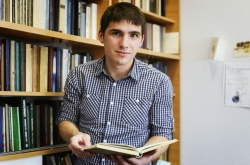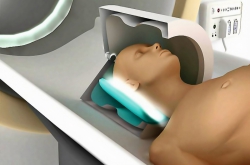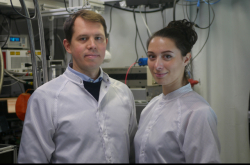Not everyone can comprehensibly explain what photonics and metamaterials are about, and what one can do in this field. Why did you decide to focus on it?
During my school years, I did a lot of physics, participated in different competitions. Initially, I planned to continue my education in Kazakhstan - my home country. Yet, something unexpected happened: ITMO representatives visited our school and told us about the programs at their university. So, I decided to give it a try, as I’ve always used every opportunity life has to offer.
I passed the entrance exams on a non-preferential basis; in the very beginning, I was offered to join the new Photonics and Optical Information Science track, but I didn’t even understand then what it was about or what I could do in this field. Yet, towards my second year, I understood that I can’t fully realize my potential on my then-current program. I spoke to Sergey Kozlov, head of the Department of Photonics and Optical Information Technology, and learned that it was an energetic department with a great and ambitious staff. So, I transferred.

At the new department, students were encouraged to do science starting in their second year, i.e. choose a research advisor and start a project. I was assigned to Pavel Belov (head of the Department of Nanophotonics and Metamaterials -- Ed.). To a pleasant surprise, he turned out to be a very open and modern person, very easy to communicate with despite his status. He explained to me what metamaterials are, and what I can achieve in this field. So, for seven years already I’ve been doing research in the field of nanophotonics and metamaterials; for example, I develop special metasurfaces capable of enhancing MRI capabilities as part of my thesis.
Back then, was it already clear to you what exactly you'd be able to work with in the field of photonics?
I wanted to try myself in a novel, rapidly developing field of physics. The department’s academic staff was really inspiring: all of its members conducted research, published papers in international journals and the like - that showed us students how interesting work in this field could be. Surely, I sometimes wondered about what I would do after I graduate - I wasn’t really sure about it. I knew there were opportunities in both science and industry, yet I put such thoughts aside and focused on my research which really made me happy.
 Pavel Belov
Pavel Belov
Did you know much about metamaterials when you first started working with Pavel Belov?
Very little. At that time, this field only started to develop. I had to study a lot of literature in English and learn to use a range of specialized programs for numerical simulation. But that didn’t scare me away. A keen command of English and my natural perseverance helped me learn the skills essential to my project.
What moved you to take risky decisions and change your life?
To achieve something, you have to get over yourself and leave your comfort zone. I understood that when I started to participate in academic competitions in school. Point is, these kinds of events have you solve non-standard tasks in a limited time frame. And this stress makes your brain work differently, lets you discover the capabilities you had but never even knew about.
Also, as I was getting ready for my first presentation at a conference, I was really scared, I doubted myself, yet I did my presentation, answered the questions - in essence, I mastered my fears and got a new skill essential for research work. What is more, when you work in a field you like, you always look for new knowledge, which already makes you leave your comfort zone. With time, it simply becomes a habit.
 Credit: physicsworld.com
Credit: physicsworld.com
You’ve applied for and received the Presidential Scholarship which allowed you to study in Australia for half a year. What did this internship give you?
I’ve wanted to do a long-term internship somewhere for quite a long time already, so when they announced the contest for the Presidential Scholarship, I didn't even give it a second thought. Actually, I didn’t know then how psychologically taxing it would be to leave the laboratory where I’d worked for seven years.
I was somewhat scared of the thought that I would live in a different country, that I’ll have to establish new contacts and conduct my research in a new team. This trip was a real challenge. On the other hand, I got the unique opportunity to learn how research is conducted at other universities, work in Yuri Kivshar’s team (professor at Australian National University and chief research associate at the Department of Nanophotonics and Metamaterials), adopt some of their methods and workstyle that can be introduced here at ITMO.
Also, when you visit another country, you get to live in unfamiliar conditions, to adapt, and this experience makes the problems you encounter later in your life a lot less complex. Any international experience is a great benefit. For scientists, such things are especially important, as internships and conferences offer you an opportunity to learn about other researchers’ work, meet them and discuss relevant subjects.
Was research on MRI-boosting metasurfaces relevant when you first started working on it?
I began working on the development of metamaterial-based devices MRI enhancement technology as part of my PhD program. At that time, this topic was new for our team, and they offered me to join this project. I actually had to study it from scratch, which took me almost a whole year. Over the three following years, we actively developed the project, and are now negotiating with medical specialists on using our devices in actual, clinical tasks. Our end goal is to create a product that will improve diagnostics and will be easy to use by doctors and laboratory assistants.

What are your future plans? Is there a chance you would begin research in some other field?
For now, it would be great if we could introduce our MRI enhancement technology in medical practice. That would mean that we’ve created a product that genuinely helps people: doctors will have an opportunity to do better diagnostics and discover diseases in their early stages. As for changing my area of research, that is possible. The world of science is similar to our everyday lives in that it constantly changes: some things that were a hot topic some 5-10 years ago can be totally forgotten, while topics discovered 20 or 30 years back can suddenly find a second life.
What is most important is to focus on doing something that makes you happy. Some believe that self-fulfillment is about having a Hirsch index of 100, and some think that it is only about doing your favourite job. In this sense, I can call myself a happy person: my decision to join the Department of Photonics and Optical Information Technologies was a landmark point in my life which I don’t regret making.
You are very motivated. Yet, not everyone is like that; people often find it hard to understand why they are doing what they do.
It has always been important to me that my parents would be proud, as they sent me to St. Petersburg and supported me. Also, it is important for me to know that I did good, I’ve accomplished something. When you know your worth, people around you also start to notice it.

But people can feel it if you don't value yourself.. Surely, you can’t really change another person, yet it is sometimes possible to stir them into leaving their comfort zone. Surely, it’s easier said than done. Yet, after taking the first step, you already perceive the world differently, it becomes full of opportunities and wonders. In this sense, different competitions are great stimuli.
How do you balance your work in the laboratory with your private life? Research must consume a lot of time.
Yes, I spend most of my time in the laboratory, but the issue here is whether you do what you do because you have to - or you want to? If you like your work, you are OK with doing it on evenings and holidays.
What is working in a modern laboratory like? Many people still see scientists as some clammed up, strict and serious people.
Scientists are very creative, you are never bored with them. We are always trying to enliven our work. For instance, when I do MR-scans as part of my research, I use not just simple objects like cubes or spheres, but also choose the more interesting shapes - fruit, for instance.
 Alena Shchelokova
Alena Shchelokova
As per my experience, scientists are really interesting and pleasant to communicate with. Most of the colleagues I know have hobbies: some are swimmers, some paint, some like quests, volleyball, dancing. I dedicate my free time to books; recently, I started to read authors I’d never got around to during my school years, Jules Verne, for instance. I also took some classes in sketching so now I can do quick sketches. It’s great, as when I come to some new place, I can draw it. I believe that it is most important for people to spend their free time in a manner that’s good for both mind and body.
As per your experience, is it possible to make good money doing photonics?
Nowadays, one shouldn’t be afraid of choosing a career in science, as there are many grants, scholarships and the like which you can use to both conduct research and support a family. Sure, it takes time and effort, but once you’ve done it a couple of times, putting together the paperwork and applying for grants becomes a lot easier.
Also, not all of my fellow alumni stayed in science. Many chose to work in industry, and are doing well for themselves. I am sure that photonics will be a promising field for quite a long time, and scientists will keep making new discoveries with different practical applications.





